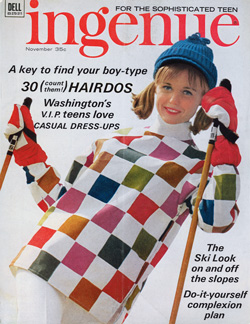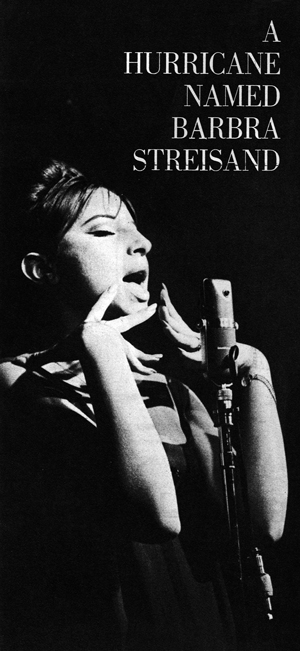
Ingenue Magazine
November 1963
by Alan Ebert
Listening to Barbra Streisand is like standing naked in the middle of a hurricane. The power and sensitivity of this little girl's huge voice is like the violent yet thrilling beauty of a storm. The power of the Streisand voice at once chills, bruises and soothes.
At twenty-one Barbra's professional star is soaring. Critics have compared her to Fanny Brice (the comedy star Barbra will portray in the upcoming Broadway musical, “Funny Girl”) to Judy Garland and Lena Horne.
Barbra Streisand is the most exciting singer in the music world today. The more personal and intimate aspects of this star-on-the-rise however, have been greeted with less than rapture. She has been labeled a “kook,” a “beatnik” and the “new nut in town.”
Barbra's appearances on television, particularly the Mike Wallace “PM East” show, have bolstered the bizarre image. Her gowns are usually waistless, featuring the Empire look, her hair droops, seemingly exhausted, on and around her face. She once wore a hat that resembled an octopus perched for an attack. And she has a penchant for stating whatever is on her mind, regardless of the time or place.
“I am not a nut,” states Barbra emphatically. “I don't know why people laugh at my clothes. They are right out of the pages of top fashion magazines.”
Barbra Streisand is frank. She is blunt. But she is not a “nut” or a “kook.” She is merely determined, at all costs, to be herself, and not what people think she should be. She doesn't care about pomp and circumstance. “Till recently,” she admits, “I lived above a fish store. It was spacious and convenient. What else matters?”
Barbra, although determined to be herself—to be an individual, is not a crusader. “Me,” she says, “I want to be a somebody—myself. You? You be whatever you want to be. I have no desire to change you.”
(Photograph by Grover Sales, Jr.)
Barbra Streisand was born to an average family and raised in a less-than-lovely section of Brooklyn. She has no love for her birthplace and considers visiting Brooklyn, “Entering another world—one I prefer not to enter.”
Of her childhood Barbra says, “I was this real ugly kid, the kind that looked absolutely ridiculous with a ribbon in her hair.” She does not laugh as she says this. “Skinny and anemic, my mother was always sending me off to some health camp somewhere.”
Like all children, Barbra had dreams. “I saw myself a movie star, wearing beautiful dresses, and making grand entrances. I daydreamed quite a lot as a kid. I always believed I was destined to be somebody very special.”
Barbra's mother pushed her along the professional children's path to a kiddie television show on which she lasted briefly. “I was hardly the Shirley Temple type,” she states. Again, there is no laugh. At sixteen, Barbra's mother arranged for her to audition at MGM. “I thought it was for the movies. I thought I'd wear a beautiful gown and dance under a huge sparkling chandelier. Instead, there was a microphone in a glass enclosed cage-like cell and a man in a booth who said, ‘All right kid, sing.’
During high school, Barbra was somewhat of a sad girl—although she doesn't or will not permit herself to think so. She was graduated from Erasmus High School in Brooklyn at sixteen—an honor student. She was a loner.
“I don't know why I always felt alone—a person apart from others, but I did. In high school, I used too much make-up, both on my lips and my eyes. Oh those crazy weird shades! I bleached my hair and wore very off-beat clothes. Why did I dress this way? Well, the kid who looked ridiculous with a ribbon in her hair as a kid didn't think she was the most gorgeous teenager either. But rather than sulk, I rebelled, I dressed the way I did to show everybody that I didn't care what they thought of me. I didn't know then that I really did.” But she adds, “I never thought of being unhappy or lonely. I hate self-pity—in myself, in anybody.”
At sixteen, Barbra found a world larger than Brooklyn. Her family could not, either financially or intellectually, expose Barbra to what's generally called “the finer things in life,” but she discovered music, art, literature when she baby sat for a couple interested in the arts. “I'm grateful,” says Barbra, “that I made the discovery late. This way, I had to attack things instinctively. On my own, I opened a whole new world—a world about which I knew nothing. It was marvelous.”
Today, Barbra speaks authoritatively on French farce, Greek drama and the masters of music. However, unless asked, she will not spout her knowledge. An intellectual snob, Barbra, most decidedly, is not.
By her late teens, Barbra was starring on Broadway, garnering whatever raves were awarded to a rather undistingnished musical, “I Can Get It For You Wholesale.” Strangely, it was not her singing, for which she has attained stardom, but her acting and comedy talents that the critics praised.
“Good,” states Barbra. “I'm not a singer but an actress who sings. There's a world of difference in the two. I approach a song as an actress approaches a part. I try to move people when I sing—make little pictures for them which they can feel and visualize.”
Barbra has been eminently successful doing this. Her first album, "The Barbra Streisand Album" (Columbia), was a huge success both in sales and in accolades. "The Second Barbra Streisand Album," recently released, is already being mentioned as a possible Grammy Award nomination for album of the year.
President Kennedy was enthralled by Barbra's voice when she sang at the White House. After her performance the President spoke with her. “He actually asked me to autograph my album. I said I, too, wanted a souvenir, either the Rose Room or his autograph. I got the autograph.”
Meeting Kennedy shook Barbra. “And that is the best thing that could have happened to me,” she says. “It seemed, until that night, that nothing could excite me any longer. Getting excited restored my faith in myself.”
Barbra Streisand is a strange young star. Barely out of her teens, she finds it difficult to get excited about the acclaim she has gained or the wondrous things that are happening to her daily. Her lack of reaction is not an affectation. At twenty-one, Barbra is a professional—with a great confidence in her talent. “It's the only thing in which I am secure. I couldn't perform in public if I felt my talent were anything less than great.” This, Barbra will tell you in total honesty. She says it without conceit, merely stating a simple fact. But her next guileless remark is, “Nothing I've done yet, in any entertainment area, has been particularly good.” Despite the acclaim for both her albums, Barbra states, “Most of the tunes could have been sung better. I'd like to do them again.”
It is the combination of ego and her belief in her inability to live up to her own expectations that makes Barbra the brilliant entertainer she is. She constantly searches for self-improvement. She will listen with patience and kindness to songwriters in the hopes of finding a song to add to her repertoire. Unlike most singers, she has a keen understanding of the feelings of creative people. She will never stop a songwriter in the middle of a song with a curt, “It's not for me,” no matter how bad the song may be.
Barbra Streisand sings up a storm, but she can be as soft and gentle as a warm summer breeze.
End.
